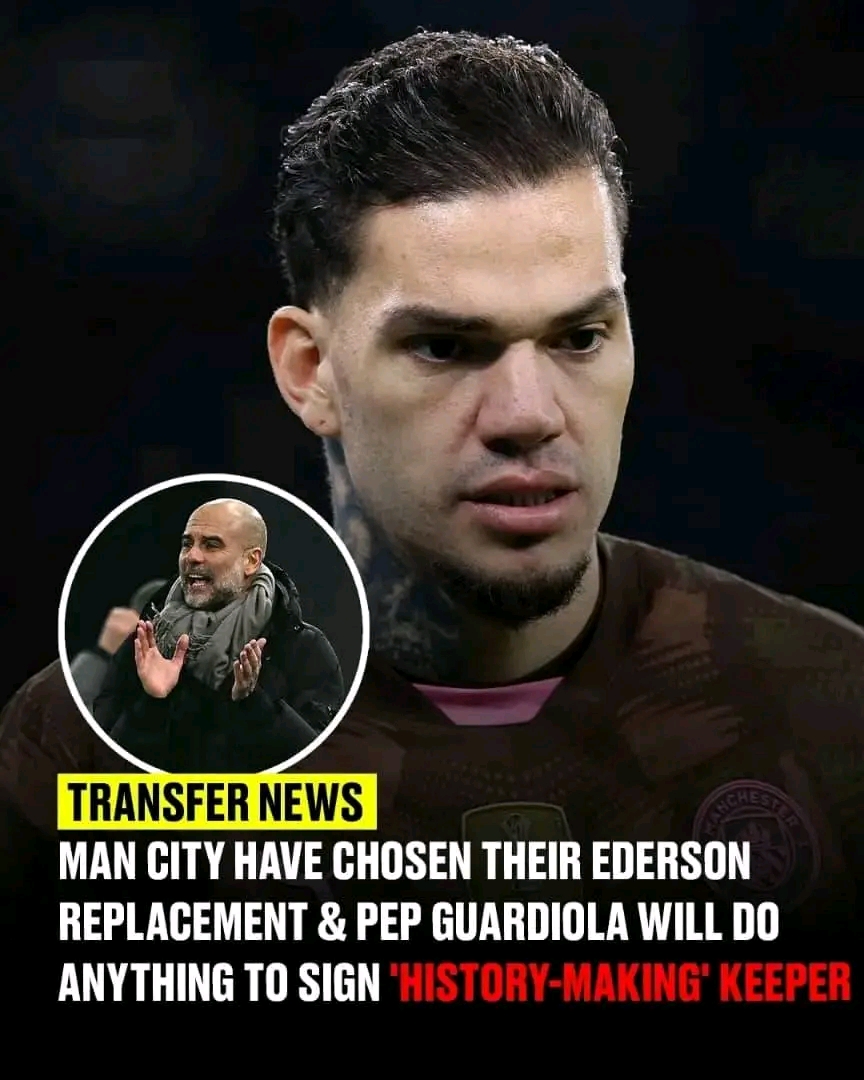Manchester City reach verbal agreement with sensational goalkeeper as Ederson replacement

Manchester City stands at a pivotal moment in their recent history, facing the prospect of replacing one of their most influential players of the Pep Guardiola era. Ederson Santana de Moraes, the Brazilian goalkeeper who has been instrumental in City’s unprecedented success over the past seven years, finds himself at the center of transfer speculation that could reshape the club’s future between the posts.
The 31-year-old shot-stopper, who will turn 32 early in the next season, has been the embodiment of Guardiola’s revolutionary approach to goalkeeping. His ability to play out from the back, launch precise long-range passes, and contribute to City’s build-up play has redefined what it means to be a modern goalkeeper in the Premier League. However, with his contract set to expire in the summer of 2026 and lucrative offers reportedly emerging from the Saudi Pro League, City’s hierarchy has recognized the need for succession planning.
The club’s proactive approach to this transition reflects the strategic thinking that has underpinned their sustained success. Rather than waiting for Ederson’s departure to become inevitable, City are already positioning themselves to secure his replacement, ensuring continuity in what has become one of the most specialized positions in their tactical setup.
Manchester City’s attention has turned to Portugal, where 25-year-old Diogo Costa has established himself as one of Europe’s most promising goalkeepers. The FC Porto captain represents the perfect blend of proven ability and untapped potential that City typically seeks in their recruitment. His journey from the Porto youth system to first-team captaincy tells the story of a player who has consistently exceeded expectations at every level.
Costa’s development within Porto’s ranks has been methodical and impressive. Since joining the club’s academy in 2011, he has progressed through every level of the organization, from youth teams to Porto B, before establishing himself as the first-choice goalkeeper. This pathway development aligns perfectly with City’s preference for players who understand the demands of elite football and have proven their ability to handle pressure in meaningful competitions.
His statistics speak volumes about his current level of performance. Leading the Portuguese league in clean sheets for consecutive seasons demonstrates not just individual excellence but also his ability to organize and inspire confidence in his defensive teammates. The fact that only four goalkeepers in Liga Portugal boast a better save percentage in the current campaign, while his performance metrics continue to improve, suggests a player who is still ascending toward his peak years.
Costa’s emergence as an international star reached its crescendo during Euro 2024, where he etched his name into tournament folklore with a penalty shootout performance that will be remembered for generations. His save of three penalties against Slovenia in the Round of 16 was not just a display of technical excellence but a demonstration of the mental fortitude required to perform under the most intense pressure.
This history-making performance served as the perfect showcase for the qualities that have attracted Manchester City’s attention. The ability to rise to the occasion in crucial moments, the technical precision required to read penalty takers’ intentions, and the leadership qualities necessary to galvanize a team in moments of crisis are all attributes that translate directly to the demands of Premier League football.
The Portugal international’s international experience extends beyond this singular moment of brilliance. His consistent performances for his country have established him as a key figure in their setup, providing him with the kind of high-level experience that proves invaluable when making the transition to one of Europe’s elite clubs.
Pep Guardiola’s approach to goalkeeping has revolutionized the position throughout his managerial career. From his early innovations with Victor Valdés at Barcelona to his refinement of the role through Manuel Neuer at Bayern Munich and subsequently Ederson at Manchester City, Guardiola has consistently demanded that his goalkeepers function as an additional outfield player during the build-up phase.
This tactical evolution requires a specific skill set that extends far beyond traditional shot-stopping abilities. The modern City goalkeeper must possess exceptional distribution skills, both with their feet and hands, demonstrate comfort when playing as a sweeper-keeper behind a high defensive line, and maintain composure under pressure when opponents press aggressively to force errors in possession.
Costa’s profile suggests he possesses many of these crucial attributes. His improvement in performance metrics, particularly his ability to save more shots than expected based on their quality and placement, indicates the kind of technical proficiency that Guardiola values. Moreover, his experience as Porto’s captain demonstrates the leadership qualities necessary to organize and communicate effectively with defensive teammates.
One of the most significant aspects of Ederson’s contribution to Manchester City’s success has been his ability to launch precise long-range passes that can bypass multiple lines of the opposition’s press. This skill has become so integral to City’s tactical approach that it has influenced how opponents prepare to face them, with many teams adjusting their pressing strategies specifically to limit these distribution opportunities
For Costa to successfully fill this role, he must demonstrate similar technical ability with his distribution. His performances in the Portuguese league suggest he possesses the fundamental skills required, but the transition to the Premier League will test his ability to execute these techniques under the increased pressure and pace that characterizes English football.
The integration of a new goalkeeper into Guardiola’s system typically requires a period of adjustment as the player learns to read the movement patterns of his teammates and understand the specific timing required for different types of distribution. City’s coaching staff will need to work closely with Costa to ensure this transition is as smooth as possible.
The involvement of Jorge Mendes and his Gestifute agency in Costa’s representation provides Manchester City with a significant advantage in any potential transfer negotiations. Mendes’ existing relationship with the club, forged through his representation of other Portuguese players including Ederson himself, creates established channels of communication that can facilitate complex transfer discussions.
This connection extends beyond mere convenience. Mendes’ understanding of Manchester City’s operational approach, their expectations for player conduct and professionalism, and their long-term strategic objectives means that any player he represents is likely to receive comprehensive preparation for the unique demands of playing for the club.
The agent’s track record of successful transfers to Manchester City provides additional confidence that any potential deal for Costa would be structured in a way that benefits all parties involved. His ability to navigate the complexities of modern football transfers, particularly those involving players moving between different leagues and countries, has been demonstrated repeatedly throughout his career.
Costa’s potential arrival at Manchester City would strengthen an already significant Portuguese contingent at the Etihad Stadium. The presence of established stars like Rúben Dias, Bernardo Silva, and Matheus Nunes would provide immediate cultural and linguistic support that could prove crucial during his adaptation period.
This Portuguese connection extends beyond mere comfort in familiar surroundings. These players understand the tactical demands of Guardiola’s system and can serve as mentors and guides as Costa learns to integrate his individual skills into the collective approach that defines Manchester City’s playing style.
The success of previous Portuguese players at the club, particularly Dias’ rapid emergence as a defensive leader and Silva’s consistent excellence across multiple seasons, demonstrates that players from this football culture can thrive in City’s environment.
Stefan Ortega’s presence at Manchester City adds an interesting dimension to the goalkeeper situation. The German shot-stopper, who joined the club in 2022, has served admirably as Ederson’s understudy and has gained valuable experience across multiple competitions this season. His performances in the Premier League, Champions League, and Carabao Cup have demonstrated his capability to perform at the highest level.
However, at almost a year older than Ederson, Ortega represents a short-term rather than long-term solution to City’s goalkeeping needs. While his experience and reliability make him an excellent backup option, the club’s strategic planning clearly focuses on identifying a goalkeeper who can serve as their first-choice for the next decade.
Ortega’s role in any transition period could prove crucial. His understanding of City’s tactical requirements and his relationship with the defensive unit could provide stability and continuity as a new first-choice goalkeeper adapts to the demands of the position. This experience makes him an invaluable asset during what could be a complex transition period.
The presence of both Ortega and potentially Costa would create a competitive environment that could benefit both players and the team as a whole. Guardiola has consistently emphasized the importance of competition within his squads, arguing that it drives players to maintain and improve their performance levels.
This competitive dynamic could prove particularly beneficial for Costa’s development. Having a experienced goalkeeper like Ortega to learn from and compete against would provide the kind of challenging environment that typically accelerates player development and adaptation to new tactical systems.
The potential transfer of Diogo Costa to Manchester City must be viewed within the context of the modern goalkeeper transfer market. The fees commanded by elite goalkeepers have increased significantly in recent years, reflecting their enhanced importance in modern tactical systems and the premium placed on players who can contribute beyond traditional shot-stopping duties.
Porto’s position as a selling club means they will be open to negotiations for the right price, but their recent success in the Portuguese league and Costa’s status as captain suggest they will demand significant compensation for their star player. The goalkeeper’s contract situation and his apparent desire to test himself at a higher level could influence the negotiation dynamics.
Manchester City’s financial resources and their track record of structured, professional transfer negotiations position them well in any potential bidding process. Their ability to offer competitive personal terms, combined with the sporting opportunities available at the club, provides them with significant advantages over many potential competitors.
From City’s perspective, the acquisition of Costa represents more than just a replacement for Ederson; it constitutes a long-term investment in a position that has become increasingly crucial to their tactical approach. At 25 years old, Costa could potentially serve as City’s first-choice goalkeeper for the next decade, providing the kind of stability and continuity that underpins sustained success.
This long-term perspective influences the financial calculations surrounding any potential transfer. While the initial outlay may be substantial, the potential return on investment, both in terms of on-field performance and possible future transfer value, justifies the expenditure within City’s strategic framework.
The transition from Porto’s tactical system to Manchester City’s sophisticated approach will represent one of the most significant challenges Costa will face if he joins the club. While his fundamental skills and attributes align with Guardiola’s requirements, the specific timing, positioning, and decision-making required in City’s system typically requires a period of intensive coaching and adaptation.
Guardiola’s attention to detail in working with goalkeepers is legendary throughout football. His ability to develop and refine players in this position has been demonstrated repeatedly throughout his career, suggesting that Costa would receive the kind of specialized coaching that could unlock his full potential.
The tactical education would extend beyond individual skills to encompass understanding of City’s pressing triggers, their defensive line positioning, and the specific distribution patterns that create the most effective attacking opportunities. This comprehensive approach to goalkeeper development reflects Guardiola’s holistic view of football and his understanding of how individual positions contribute to collective success.
The Premier League presents unique challenges that differ significantly from other European leagues. The pace of play, the physical demands placed on goalkeepers, and the variety of attacking styles employed by different teams require adaptation and preparation that extends beyond pure technical ability.
Costa’s experience in Portuguese football, while valuable, will need to be supplemented by rapid adaptation to these new demands. The increased frequency of crosses, the different styles of pressing employed by Premier League teams, and the unique challenges posed by English football culture will all require adjustment.
However, his international experience and his performances in European competitions with Porto provide evidence that he possesses the mental resilience and adaptability required to succeed in new environments.
Replacing a goalkeeper of Ederson’s caliber and importance to Manchester City’s success represents one of the most challenging succession planning exercises in modern football. The Brazilian’s contributions extend far beyond statistics and highlight reels; his influence on City’s tactical evolution and his role in their most successful period cannot be easily quantified.
Costa’s challenge will be to establish his own identity within City’s system while maintaining the high standards and tactical sophistication that Ederson has provided. This balancing act between continuity and evolution will define the success of any transition between the posts.
The pressure of replacing such an influential figure could prove either motivating or overwhelming, depending on Costa’s mental approach and the support structure provided by the club. City’s experience in managing high-profile transitions suggests they understand the importance of providing appropriate support during such periods.
Manchester City’s pursuit of Diogo Costa represents more than a simple transfer; it signifies the beginning of a new chapter in the club’s ongoing evolution. The potential acquisition of the Portuguese goalkeeper reflects the strategic thinking and forward planning that has characterized the club’s most successful periods.
Costa’s combination of proven ability, untapped potential, and tactical suitability makes him an ideal candidate to continue City’s goalkeeping traditions while potentially adding his own innovations to the role. His history-making performances on the international stage demonstrate the kind of big-game mentality that thrives under Guardiola’s management.
As the transfer window progresses and negotiations potentially intensify, the football world will watch with interest to see whether Manchester City can secure their chosen successor to Ederson. The success of this transition could prove crucial not just for the immediate future but for the next decade of the club’s ambitious plans.
The goalkeeping position at Manchester City has evolved into something far more complex and influential than traditional shot-stopping roles. Costa’s challenge, should he join the club, will be to master these demands while adding his own unique contributions to what has become one of the most specialized and important positions in modern football.















